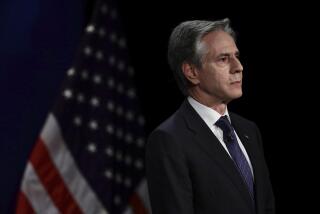U.S. Warns India an A-Test Would Imperil Aid, Ties
- Share via
WASHINGTON — In the first use of a sweeping anti-nuclear law, the Clinton administration quietly warned India last month that if it conducts a nuclear test, the United States will cut off virtually all the economic benefits New Delhi receives from the U.S.
The unpublicized message was delivered after U.S. intelligence officials detected early signs that India might be preparing to conduct a nuclear test explosion. U.S. officials, reportedly including U.S. Ambassador to India Frank Wisner, cautioned New Delhi that any such test would prompt the administration to invoke a little-known 1994 statute called the Glenn Amendment.
That law requires the United States to cut off all economic aid, military aid, credits, bank loans and export licenses to any country, other than the five acknowledged nuclear powers, that tests a nuclear weapon. Even more important for India, the law dictates that the United States will oppose World Bank loans and all other international lending to the offending nation.
The loss of these benefits could cost India billions of dollars. Its loans from the World Bank amount to about $2 billion a year. India gets $173 million a year in economic aid from the United States. And the curb on export licenses would mean that, at least in theory, India would be unable even to buy new computers from the U.S.
The Glenn Amendment, sponsored by Sen. John Glenn (D-Ohio), has never been invoked before. “This is the first time [since 1994] we’ve ever had a scare of any actual detonation,” said one U.S. official.
*
India conducted its only nuclear explosion in 1974 and has not carried out any new tests. Indian officials have denied that they are planning to do so, despite news reports in Washington last month of possible preparations.
Asked about the U.S. warning, Shyamala Cowsik, deputy chief of mission for the Indian Embassy in Washington, replied: “We know that the Glenn Amendment exists. But there has been no such demarche [diplomatic approach] with us here.” She said she did not know of any warnings delivered in New Delhi.
The 1994 anti-proliferation law applies to all undeclared nuclear-weapon states. In effect, that means every country in the world except the five members of the U.N. Security Council: the United States, Britain, France, Russia and China.
Any other country--including Israel or Pakistan, which like India are believed to have well-developed nuclear weapon programs--would be subject to the same broad economic sanctions if it carried out a nuclear test.
A State Department spokesman declined to comment on the American warning to India. But another administration official confirmed: “We certainly brought to India’s attention the legally mandated sanctions that would apply if they conducted a test.”
Over the past few years, the United States has sought to improve its ties to India, the dominant power in South Asia. At the same time, India has sought U.S. investment and other help to buttress Prime Minister P. V. Narasimha Rao’s economic reform program.
*
India is now the third-largest recipient of loans from the World Bank, after China and Mexico. The U.S. is the leading shareholder in the World Bank, and thus has the greatest number of votes on the board that approves billions of dollars in bank loans.
The United States could not block World Bank loans to India without some support from other nations. But Japan and Germany, which have strongly opposed nuclear testing, are the World Bank’s second and third leading shareholders.
Usually, when Congress passes a law that would impose economic sanctions on another nation, it includes language giving the president the power to grant a waiver blocking the sanctions from ever taking effect. In that way, Congress can appear to be taking tough action, while passing the buck to the president to limit the impact.
But the unusual anti-nuclear provision makes it virtually impossible for President Clinton to prevent sanctions from taking effect.
It says the president can grant a single, 30-day delay of the penalties. After that, the president can waive the sanctions only if both houses of Congress formally approve a authorizing resolution.
More to Read
Sign up for Essential California
The most important California stories and recommendations in your inbox every morning.
You may occasionally receive promotional content from the Los Angeles Times.








